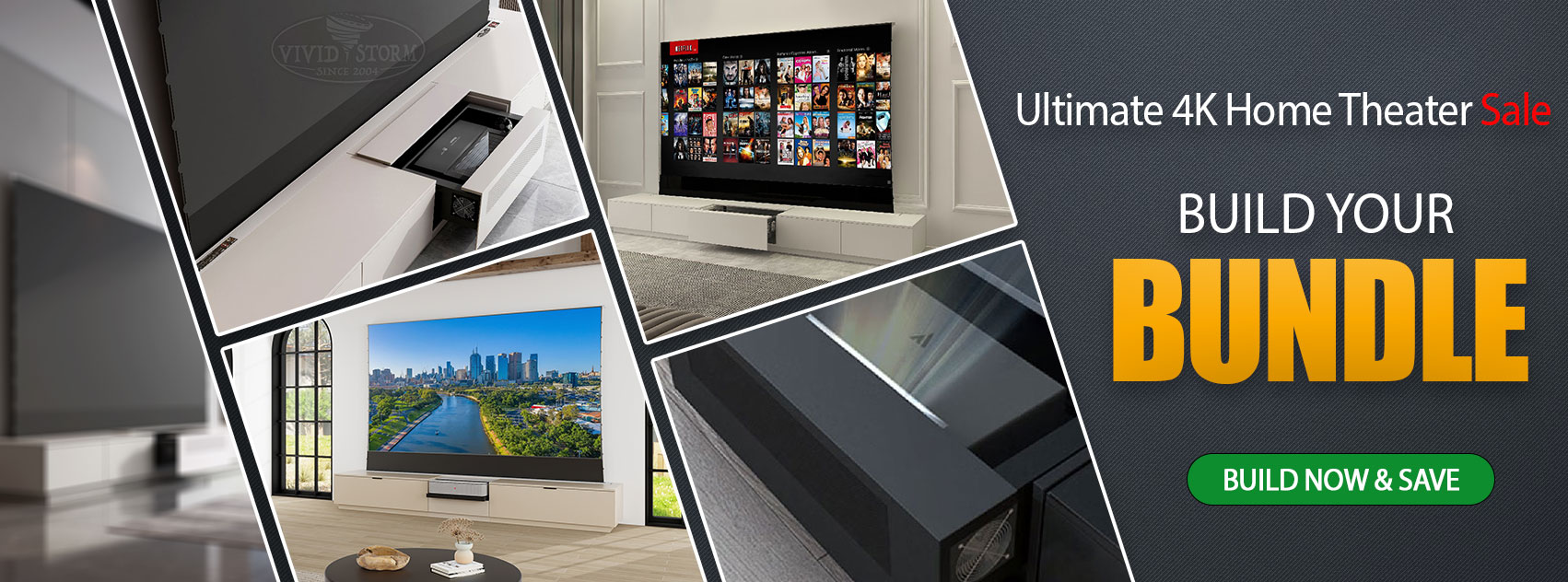Build Your Home Theater Bundle Deal
mj59jm2025-07-25T20:39:56-07:00
Customise your home theater package, bundle a screen with optional projectors, cabinets and accessories.
|
……
|
|
|
……
|
|
|
……
|
|
|
……
|
USD $590.40 – USD $34,589.80
Bundle a projector with a motorised cabinet and more. Save 10% on all items in the bundle.
|
……
|
|
|
……
|
|
|
……
|
|
|
……
|
USD $1,439.10 – USD $34,589.80
Choosing the right 4K projector for your home theater involves considering several factors to ensure you get the best viewing experience. Here are some important steps to help you make an informed decision:
Budget: Determine your budget range for the projector. 4K projectors come in a variety of price points, so knowing how much you’re willing to spend will help narrow down your options.
Room Environment and Size: Consider the size of your room and the lighting conditions. If your room is small, you might not need an ultra-bright projector. If you have control over ambient lighting, you can opt for a projector with better contrast.
Resolution and Technology: Make sure the projector offers true 4K resolution (3840×2160 pixels) for a sharp and detailed image. There are also technologies like DLP and LCD, each with their own advantages and disadvantages. Research these technologies to determine which one suits your preferences.
Brightness and Lumens: Brightness is measured in lumens. For dedicated home theaters with controlled lighting, a brightness of around 1500-2000 lumens is sufficient. However, if you have ambient light, you may need a brighter projector.
Contrast Ratio: A higher contrast ratio provides better differentiation between dark and light areas, resulting in more vibrant images. Look for projectors with high native contrast ratios or dynamic contrast enhancement features.
Throw Distance and Screen Size: Calculate the throw distance (distance from projector to screen) and screen size you need based on your room layout. Some projectors offer flexible zoom and lens shift options to adjust the image size and position without moving the projector.
Connectivity: Ensure the projector has the right ports and connectivity options for your devices, such as HDMI, USB, and audio outputs. This is crucial for connecting Blu-ray players, gaming consoles, streaming devices, and more.
Features: Look for additional features like lens memory for different aspect ratios, 3D capability (if desired), image enhancement technologies, and built-in speakers (though a separate sound system is recommended for better audio quality).
Brand and Reviews: Research reputable brands known for producing quality projectors. Read reviews from both experts and customers to get an idea of real-world performance and reliability.
Warranty and Support: Check the warranty period and customer support options. A longer warranty can provide peace of mind, and responsive customer support can be helpful if you encounter any issues.
Calibration and Settings: Once you’ve purchased the projector, take the time to properly calibrate it for optimal image quality. This might involve adjusting settings for brightness, contrast, color accuracy, and more.
Future-Proofing: Consider whether the projector supports emerging technologies, such as HDR formats and advanced color spaces, to ensure your investment remains relevant for years to come.
By considering these factors and doing thorough research, you’ll be better equipped to select a 4K projector that aligns with your home theater needs and preferences.
Choosing the right Ambient Light Rejecting (ALR) screen for your 4K Ultra Short Throw (UST) projector is crucial to achieving the best possible image quality in environments with ambient light. Here’s a guide to help you select the right ALR screen for your setup:
Understand ALR Technology: ALR screens are designed to mitigate the effects of ambient light by reflecting only the projector’s light while minimizing external light interference. They use specialized coatings and materials to enhance contrast and color accuracy. Understand the basics of ALR technology before making a choice.
Consider UST Compatibility: Ensure that the ALR screen you’re considering is compatible with Ultra Short Throw projectors. UST projectors project at a steep angle, and some ALR screens are designed specifically for this purpose.
Screen Gain: Screen gain refers to the amount of light the screen reflects back to the viewer. A higher gain enhances brightness, but it can also affect viewing angles and hotspotting. For UST projectors, screens with lower gain (typically 1.0 to 1.3) are recommended to prevent hotspots and maintain consistent brightness across the screen.
Viewing Angle: ALR screens often have narrower optimal viewing angles compared to traditional screens. Test the screen from various seating positions in your room to ensure everyone gets a good viewing experience.
Room Lighting: Evaluate the lighting conditions in your room. If you have significant ambient light, an ALR screen is beneficial. The level of ambient light will help determine how aggressive the ALR properties should be. Some ALR screens are better suited for moderate ambient light, while others are optimized for brighter rooms.
Color Accuracy: Look for an ALR screen that maintains accurate color representation. Some screens might shift colors or introduce artifacts, which can be particularly noticeable in 4K content. Read reviews and consider screen samples if possible.
Screen Size and Aspect Ratio: Choose a screen size and aspect ratio that matches your projector’s capabilities and your room’s layout. Make sure the ALR screen is available in the size you need.
Screen Material and Coating: Different ALR screens use various materials and coatings to achieve ambient light rejection. Research the specific technology used by the screen and how well it performs in real-world scenarios.
Reviews and Recommendations: Read user reviews and seek recommendations from other UST projector owners. Learning from their experiences can provide valuable insights into how different ALR screens perform in practical settings.
Cost and Brand Reputation: Set a budget for your ALR screen and explore options within that range. Reputable brands often offer better quality and customer support, but also consider lesser-known brands if they have positive reviews and a track record of quality.
Demo and Testing: If possible, visit a showroom or an AV store to see ALR screens in action with UST projectors. This can give you a firsthand experience of how the screen performs in different lighting conditions.
Remember that the ALR screen you choose should align with your specific room setup, lighting conditions, and viewing preferences. Taking the time to research and possibly test different options will help you find the perfect ALR screen for your 4K UST projector.
VIVIDSTORM projector screens have gained a reputation for being an excellent choice for 4K Ultra Short Throw (UST) projectors due to several key features and technologies that contribute to an enhanced viewing experience. Here are some reasons why VIVIDSTORM projector screens might be considered the best choice for 4K UST projectors:
ALR Technology: VIVIDSTORM screens are often equipped with advanced Ambient Light Rejecting (ALR) technology. This means they are designed to efficiently reject ambient light, allowing the projector’s image to stand out even in rooms with moderate to high levels of ambient light. This is crucial for maintaining image clarity and color accuracy, which is particularly important for 4K content.
Ultra Short Throw Compatibility: VIVIDSTORM screens are engineered to work optimally with Ultra Short Throw projectors. They are designed to handle the unique angle at which UST projectors project light, ensuring that the image remains uniform and free from artifacts.
High-Quality Materials: VIVIDSTORM screens often use high-quality materials and coatings that are designed to preserve the integrity of the projected image. These materials are carefully selected to minimize color shifts and artifacts, which can be especially noticeable in 4K content.
Screen Gain and Uniformity: VIVIDSTORM screens typically have a balanced screen gain that enhances brightness without causing hotspotting or sacrificing viewing angles. This is essential for maintaining a consistent and vibrant image across the entire screen, which is especially important for larger UST projections.
Color Accuracy: VIVIDSTORM screens are engineered to maintain accurate color representation. This is crucial for enjoying the full benefits of 4K content, where the details and subtleties of colors are more pronounced.
Wide Viewing Angles: Many VIVIDSTORM screens offer wide viewing angles, ensuring that everyone in the room can enjoy the same high-quality image, regardless of their seating position.
Easy Installation: VIVIDSTORM screens often come with easy-to-follow installation guides and mounting solutions that simplify the setup process, allowing you to start enjoying your 4K content quickly.
Brand Reputation: VIVIDSTORM has gained recognition as a brand that specializes in projection screens, and their commitment to quality and innovation has contributed to their positive reputation in the market.
Customer Reviews: Positive reviews and testimonials from customers who have used VIVIDSTORM screens with their 4K UST projectors can provide valuable insights into the real-world performance and benefits of these screens.
Variety of Options: VIVIDSTORM offers a range of screen sizes and formats to accommodate different room sizes and layouts, ensuring you can find a screen that fits your specific needs.
Ultimately, the choice of a projector screen is a personal one and should be based on your specific requirements, room environment, and preferences. While VIVIDSTORM screens are often praised for their compatibility with 4K UST projectors, it’s important to conduct thorough research and possibly even see a screen in action before making a decision.
